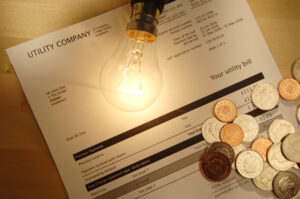 Electronic signatures—or e-signatures—are everywhere. We click “Agree” or type our name on a device to open bank accounts, purchase vehicles, rent apartments, or accept online terms. Before you sign electronically, here’s what to know.
Electronic signatures—or e-signatures—are everywhere. We click “Agree” or type our name on a device to open bank accounts, purchase vehicles, rent apartments, or accept online terms. Before you sign electronically, here’s what to know.
Are E-Signatures as binding as an actual “Wet Ink” Signature? Not Always!
An e-signature can be as valid as a handwritten one, but only if certain rules are met. Businesses must get your consent to use electronic records. As well, they must prove you can open and read them. Often a test file is sent to the consumer to confirm receipt. The business must also inform the consumer of the following:
 1. The option to receive paper copies
1. The option to receive paper copies
2. The option to withdraw consent at anytime, and explain how to do it.
3. Whether consent applies to one deal or all future ones.
4. How to update contact information.
5. The type of device or software is needed to receive communications.
These safeguards exist so that consumers are not tricked into signing documents that may be difficult to see online or save.
What is an “E-Signature”?
The term “e-signature” is more than a digital image of your written signature. The law defines “electronic signature” broadly. It is any sound, symbol, or process used to show intent to sign a document. E-signatures can be:
-
-
- Typing your name at the end of an email
- Clicking an “I agree” button
- Uploading an image of your handwritten signature
- Saying “yes” in a recorded call.
-
 The key is intent—you must intend to sign the electronic contract that your signature is applied to. But some companies may forge or copy and paste e-signatures to contracts that were never approved by the consumer. Forging an e-signature is illegal, just like forging a signature in ink on paper.
The key is intent—you must intend to sign the electronic contract that your signature is applied to. But some companies may forge or copy and paste e-signatures to contracts that were never approved by the consumer. Forging an e-signature is illegal, just like forging a signature in ink on paper.
What “Metadata” Reveals
When you sign electronically, the system stores “metadata”, or hidden information that proves authenticity of the electronic document. Metadata
can show:

- Personal information: name, email or IP address
- Time and place: exact date, time and location when a signature was applied
- Device details: the computer, phone, tablet, or other device used to apply the signature
- Security codes: Digital ID that shows the file was not changed.
Metadata can even show whether a signature was forged—like proving it came from a location you had never been or device you never used.
Are ink signatures on paper documents still required?
 While e-signatures are legal on many documents, some notices, such as those listed below, are required to be delivered in paper form and signed in ink. This is to insure that the person is fully informed and in agreement with the document.
While e-signatures are legal on many documents, some notices, such as those listed below, are required to be delivered in paper form and signed in ink. This is to insure that the person is fully informed and in agreement with the document.
-
-
- Car repossession or mortgage foreclosure notices
- Utility, insurance, or benefit cancellations
- Eviction notices
- Lawsuits
- Product recalls or safety warnings
- Documents involving hazardous materials
-
The Bottom Line
Be cautious.
E-signatures are fast and convenient. Used correctly, they are safe and legally binding. However, salespeople are trained to guide consumers in the purchase process and make them feel comfortable to get an e-signature on the documents they need.
Do your due diligence BEFORE e-signing
1) Take time to read all documents that are signed.
2) Get all questions answered.
3) Do not feel pressured to sign.
4) Request a paper copy of all documents showing your e-signature.
5) Maintain a complete file with all documents, handwritten notes, emails, text and phone messages.
Seek help from a qualified consumer law firm
 Was your e-signature forged on a document? Were you tricked into an agreement?
Was your e-signature forged on a document? Were you tricked into an agreement?
Contact us.
Flitter Milz has helped many consumers across the country hold companies accountable for electronic forgery and deceptive practices in the use of
e-signatures.
For a no cost legal evaluation.
Phone: 888-668-1225
Email: consumers@consumerslaw.com



 Some common traps could leave you stuck with a bad deal for decades when entering a contract for solar panels. Nationally recognized consumer protection attorney Andy Milz of Flitter Milz in Narberth, PA, was interviewed recently on CNET for an article and offered 4 Financial Red Flags to potential solar panel customers.
Some common traps could leave you stuck with a bad deal for decades when entering a contract for solar panels. Nationally recognized consumer protection attorney Andy Milz of Flitter Milz in Narberth, PA, was interviewed recently on CNET for an article and offered 4 Financial Red Flags to potential solar panel customers. Our firm gets a lot of calls from consumers who are senior citizens, or from their children, after they have realized that the “free” solar panel deal they were promised is nothing of the sort.
Our firm gets a lot of calls from consumers who are senior citizens, or from their children, after they have realized that the “free” solar panel deal they were promised is nothing of the sort. Every week, we hear similar complaints from consumers who met with a solar sales representative and felt taken. Statements such as the following may be deceptive or outright false:
Every week, we hear similar complaints from consumers who met with a solar sales representative and felt taken. Statements such as the following may be deceptive or outright false: Salespeople are likely to tout a 30% federal solar tax credit (for 2023). Consumers must be careful, this is not cash or a refund, but rather a tax credit to count against the taxes you pay. Some seniors pay only minimal taxes or no taxes at all (if, for instance, their sole income is Social Security) and may not benefit at all from this promised “government program.” Other times, the company keeps the tax credit for itself.
Salespeople are likely to tout a 30% federal solar tax credit (for 2023). Consumers must be careful, this is not cash or a refund, but rather a tax credit to count against the taxes you pay. Some seniors pay only minimal taxes or no taxes at all (if, for instance, their sole income is Social Security) and may not benefit at all from this promised “government program.” Other times, the company keeps the tax credit for itself. Salesmen also like to tout a “no cost installation” or “no upfront cost” because this makes it sound like the consumer is getting the solar panels for free. That is not the case. With programs like solar leases or power purchase agreements (PPAs), it is the solar company, not the consumer, who owns the panels that are installed on the roof.
Salesmen also like to tout a “no cost installation” or “no upfront cost” because this makes it sound like the consumer is getting the solar panels for free. That is not the case. With programs like solar leases or power purchase agreements (PPAs), it is the solar company, not the consumer, who owns the panels that are installed on the roof. While the solar company may not charge upfront for the panels and the installation, the consumer is bound to pay for the energy that’s produced by the panels at ever-increasing rates – sometimes for 25-years or more – forcing some elderly consumers to pay expensive rates until they’re over 100 years old. All the while, they are still obligated to pay their electric bill.
While the solar company may not charge upfront for the panels and the installation, the consumer is bound to pay for the energy that’s produced by the panels at ever-increasing rates – sometimes for 25-years or more – forcing some elderly consumers to pay expensive rates until they’re over 100 years old. All the while, they are still obligated to pay their electric bill. Solar sales can be expensive and burdensome to consumers. Solar salesmen know this, and that’s why they use electronically displayed and signed contract documents (instead of a paper contract that you hold and keep) with deceptive language to hide the agreement from elderly consumers by using a bum email address or making up an email address that only the sellers control.
Solar sales can be expensive and burdensome to consumers. Solar salesmen know this, and that’s why they use electronically displayed and signed contract documents (instead of a paper contract that you hold and keep) with deceptive language to hide the agreement from elderly consumers by using a bum email address or making up an email address that only the sellers control.

 Maybe you aren’t completely sold on solar panels, and simply want more information about switching to solar power. Beware. At this point of the presentation, the salesperson may casually suggest that you submit an application, just to see whether or not you qualify for solar panels. You’ll be offered an iPad or tablet to sign, and be told not to worry because you’ll receive copies of all documents by email.
Maybe you aren’t completely sold on solar panels, and simply want more information about switching to solar power. Beware. At this point of the presentation, the salesperson may casually suggest that you submit an application, just to see whether or not you qualify for solar panels. You’ll be offered an iPad or tablet to sign, and be told not to worry because you’ll receive copies of all documents by email. Placing your signature or initials on an iPad, tablet, or phone may seem easy. However, your electronic signature or initials may be copied and affixed to a contract or other forms that you did not intend.
Placing your signature or initials on an iPad, tablet, or phone may seem easy. However, your electronic signature or initials may be copied and affixed to a contract or other forms that you did not intend. Solar companies rely on financing to make solar panels available to consumers. Credit reports are accessed to evaluate a potential customer’s creditworthiness. The consumer must provide written permission for the solar company to obtain these reports.
Solar companies rely on financing to make solar panels available to consumers. Credit reports are accessed to evaluate a potential customer’s creditworthiness. The consumer must provide written permission for the solar company to obtain these reports. Solar panels will be free.
Solar panels will be free. Many times, the solar panel company may not want to sell you the panels. If you, the buyer, purchases the panels, you would receive the tax credit, not the solar company. If the solar company leases you panels and only promises to sell you the solar power, the solar sales company may receive the tax credit, not you, the homeowner.
Many times, the solar panel company may not want to sell you the panels. If you, the buyer, purchases the panels, you would receive the tax credit, not the solar company. If the solar company leases you panels and only promises to sell you the solar power, the solar sales company may receive the tax credit, not you, the homeowner. Your Neighbors Are Doing It!
Your Neighbors Are Doing It! Flitter Milz is a nationally recognized consumer protection law firm that evaluates solar panel sales matters for potential violation of the consumer protection laws involving fraud, such as forged contracts, identity theft and credit reporting privacy violations.
Flitter Milz is a nationally recognized consumer protection law firm that evaluates solar panel sales matters for potential violation of the consumer protection laws involving fraud, such as forged contracts, identity theft and credit reporting privacy violations. 
 In online complaints, Titan Solar has been accused of engaging in predatory marketing and of misrepresenting facts. Sometimes, Titan Solar is accused of not informing the customer that installation is conditioned upon agreeing to a decades-long loan or power purchase agreement, and the contract might be hidden from the consumer. Titan Solar’s finance company partner may also pull your
In online complaints, Titan Solar has been accused of engaging in predatory marketing and of misrepresenting facts. Sometimes, Titan Solar is accused of not informing the customer that installation is conditioned upon agreeing to a decades-long loan or power purchase agreement, and the contract might be hidden from the consumer. Titan Solar’s finance company partner may also pull your  some other legitimate business purpose for pulling your credit. Often, during the process of applying for new credit or utilities, or interviewing with a prospective employer or landlord, there may be a request to access the consumer’s credit file. The consumer must provide written permission for his or her credit file to be accessed.
some other legitimate business purpose for pulling your credit. Often, during the process of applying for new credit or utilities, or interviewing with a prospective employer or landlord, there may be a request to access the consumer’s credit file. The consumer must provide written permission for his or her credit file to be accessed. Lenders evaluate the number of hard inquiries that appear on a consumer’s credit reports during the credit application review process. Although hard inquiries represent one factor in the calculation of credit scores, too many hard inquiries in a short time could impact scores negatively and jeopardize the approval of a new credit application.
Lenders evaluate the number of hard inquiries that appear on a consumer’s credit reports during the credit application review process. Although hard inquiries represent one factor in the calculation of credit scores, too many hard inquiries in a short time could impact scores negatively and jeopardize the approval of a new credit application.
 Similar to purchasing other items for the home, when considering solar panels, homeowners must shop around, get quotes, and investigate solar panel companies to compare one offer from another. There are a wide variety of products on the market with varying levels of efficiency, durability, reliability, output and design. As well, there are a number of solar companies and installers — some are better than others. Check the company’s reputation to see if complaints been filed against them with the Federal Trade Commission, State Attorney General, or Better Business Bureau? Also, searching court dockets for lawsuits that have been filed against solar panel companies or their finance companies may provide insight to issues that other consumer’s have faced involving solar transactions.
Similar to purchasing other items for the home, when considering solar panels, homeowners must shop around, get quotes, and investigate solar panel companies to compare one offer from another. There are a wide variety of products on the market with varying levels of efficiency, durability, reliability, output and design. As well, there are a number of solar companies and installers — some are better than others. Check the company’s reputation to see if complaints been filed against them with the Federal Trade Commission, State Attorney General, or Better Business Bureau? Also, searching court dockets for lawsuits that have been filed against solar panel companies or their finance companies may provide insight to issues that other consumer’s have faced involving solar transactions. of the benefits of solar power, the consumer is presented an iPad or tablet to sign, believing their signature gives the salesman permission to evaluate the property for panels. However, the signature, or initials, on an iPad may authorize the solar company, without the consumer’s knowledge, to:
of the benefits of solar power, the consumer is presented an iPad or tablet to sign, believing their signature gives the salesman permission to evaluate the property for panels. However, the signature, or initials, on an iPad may authorize the solar company, without the consumer’s knowledge, to: Solar loans work like other home improvement loans. The loan is taken out through a finance company with monthly payments made to the lender for the purchase of the system. Just like researching the solar company, homeowners must research the best way to finance the solar power system. There are several companies, such as Goodleap, Mosaic, or Sunlight Financial, that offer loans for solar panels. But ask yourself, which one offers the best terms for me?
Solar loans work like other home improvement loans. The loan is taken out through a finance company with monthly payments made to the lender for the purchase of the system. Just like researching the solar company, homeowners must research the best way to finance the solar power system. There are several companies, such as Goodleap, Mosaic, or Sunlight Financial, that offer loans for solar panels. But ask yourself, which one offers the best terms for me? to-door sales companies who sometimes entice people to sign up for “free” solar panels. Hundreds of consumers have complained about Loanpal/Goodleap’s business practices to the Better Business Bureau. The Better Business Bureau has rated Loanpal an “F.” From customer reviews, Loanpal received only one out of five stars. In fact, some consumers complain that they never saw or signed a contract. When faced with accusations that the solar panel salesperson engaged in fraud — such as signing up a consumer for a loan without their knowledge or consent — Goodleap has attempted to distance itself from the solar panel company.
to-door sales companies who sometimes entice people to sign up for “free” solar panels. Hundreds of consumers have complained about Loanpal/Goodleap’s business practices to the Better Business Bureau. The Better Business Bureau has rated Loanpal an “F.” From customer reviews, Loanpal received only one out of five stars. In fact, some consumers complain that they never saw or signed a contract. When faced with accusations that the solar panel salesperson engaged in fraud — such as signing up a consumer for a loan without their knowledge or consent — Goodleap has attempted to distance itself from the solar panel company.
 Before contacting a solar sales company, the homeowner should take time to evaluate whether adding solar panels to the home would provide enough financial benefit, plus meet the energy needs of the household. Factors for consideration are: house size, roof — condition and dimensions, climate zone, community regulations, local electricity rates and government incentives. As well, the homeowner may contemplate the following:
Before contacting a solar sales company, the homeowner should take time to evaluate whether adding solar panels to the home would provide enough financial benefit, plus meet the energy needs of the household. Factors for consideration are: house size, roof — condition and dimensions, climate zone, community regulations, local electricity rates and government incentives. As well, the homeowner may contemplate the following: Determine ways that may reduce the current expense such as, changing light bulbs; installing dimmers; fixing a leaking faucet; repairing ductwork. Understand your cost of energy and how much you might save by changing to solar.
Determine ways that may reduce the current expense such as, changing light bulbs; installing dimmers; fixing a leaking faucet; repairing ductwork. Understand your cost of energy and how much you might save by changing to solar. Evaluate the sun’s path during daylight hours. How many hours of the day does the roof get sunlight? Calculate the number of hours that your roof is shaded. Does the sun/shade ratio change from season-to-season? Would solar panels provide the same benefit throughout the year?
Evaluate the sun’s path during daylight hours. How many hours of the day does the roof get sunlight? Calculate the number of hours that your roof is shaded. Does the sun/shade ratio change from season-to-season? Would solar panels provide the same benefit throughout the year? Does the roof and/or shingles require repair or replacement before installation of panels? Will the roof handle the weight of solar panels? Shall I contact an independent roofer to evaluate the roof’s condition?
Does the roof and/or shingles require repair or replacement before installation of panels? Will the roof handle the weight of solar panels? Shall I contact an independent roofer to evaluate the roof’s condition? Review landscaping around the property for sun exposure to the roof. Will panels get enough sunlight to perform at maximum efficiency? Consult with an arborist to estimate tree growth over a 25 year period and the impact of sunlight over the seasons. Will trees require removal or transplant?
Review landscaping around the property for sun exposure to the roof. Will panels get enough sunlight to perform at maximum efficiency? Consult with an arborist to estimate tree growth over a 25 year period and the impact of sunlight over the seasons. Will trees require removal or transplant? Before entering an agreement for a solar power system, whether as an initial purchase, refinancing an existing contract, or purchasing a home with an existing system, you, the consumer, must obtain a copy of the solar panel contract. Take time to review the terms of the agreement. If you need clarification, consult with a real estate agent or real estate attorney for explanation of your legal and financial obligation. Determine whether this agreement is right for you by evaluating:
Before entering an agreement for a solar power system, whether as an initial purchase, refinancing an existing contract, or purchasing a home with an existing system, you, the consumer, must obtain a copy of the solar panel contract. Take time to review the terms of the agreement. If you need clarification, consult with a real estate agent or real estate attorney for explanation of your legal and financial obligation. Determine whether this agreement is right for you by evaluating: There may be a knock on your door by a friendly solar panel sales representative. You may be informed of the benefits of solar power and that by choosing to get panels for your home they would be ‘free’.
There may be a knock on your door by a friendly solar panel sales representative. You may be informed of the benefits of solar power and that by choosing to get panels for your home they would be ‘free’. A solar company sales representative may inform you that by signing up for solar power, you won’t have to pay for the panels themselves — they will be given to you for free.
A solar company sales representative may inform you that by signing up for solar power, you won’t have to pay for the panels themselves — they will be given to you for free. Because both of these types of arrangements – a lease and a PPA – involve paying for electricity-generating equipment over a lengthy contract period, those ‘free’ panels that you were promised may be anything but. Once installed on your home’s roof, you will still end up paying toward an entire system that is leased or rented, for a number of years. In the end, the savings you may reap from the solar generated electricity itself may not be enough to make up for those ‘free’ panels.
Because both of these types of arrangements – a lease and a PPA – involve paying for electricity-generating equipment over a lengthy contract period, those ‘free’ panels that you were promised may be anything but. Once installed on your home’s roof, you will still end up paying toward an entire system that is leased or rented, for a number of years. In the end, the savings you may reap from the solar generated electricity itself may not be enough to make up for those ‘free’ panels. Many door-to-door solar sales representatives often ask the consumer to make quick, on-the-spot decisions about obtaining solar power for the home. It is not unusual for the homeowner to feel pressured and the need to act immediately.
Many door-to-door solar sales representatives often ask the consumer to make quick, on-the-spot decisions about obtaining solar power for the home. It is not unusual for the homeowner to feel pressured and the need to act immediately. Flitter Milz is a nationally recognized consumer protection law firm experienced in evaluating fraudulent sales tactics, such as forgery, identity theft and unauthorized credit pulls by solar panel salesmen. If you feel as though you may have been
Flitter Milz is a nationally recognized consumer protection law firm experienced in evaluating fraudulent sales tactics, such as forgery, identity theft and unauthorized credit pulls by solar panel salesmen. If you feel as though you may have been 






